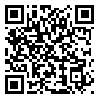

BibTeX | RIS | EndNote | Medlars | ProCite | Reference Manager | RefWorks
Send citation to:
URL: http://hcjournal.arums.ac.ir/article-1-549-en.html
Background & objectives: Esophageal cancer is the sixth common cancer in Iran. Ardabil province is located on the esophagus cancer belt worldwide. Moreover, this province is considered as a region with high incidence of esophageal cancer in Iran. This study examined the role of personality factors and religious beliefs in resiliency of disease among patients with esophageal cancer in the city of Ardabil.
Methods: This study was a descriptive and correlational research. The study population included all patients with esophageal cancer that were referred to Imam Khomeini hospital, Aras Clinic and Shafa Parto Chemotherapy Clinic during the first six months of 2015. Of the patients, 80 patients with esophageal cancer were selected to the study by convenience sampling. To collect the data, Connor-Davidson Resilience questionnaire, personality dimensions of McCrae and Costa questionnaire, religious beliefs spirituality of Hall and Edwards’s questionnaire were used. In the end, data analyzed using Pearson correlation coefficient and multiple regression in SPSS (ver. 21).
Results: There was a significant relationship between religious beliefs and personality dimensions and resiliency in patients with esophageal cancer. In addition, there were negative relationship between resilience and religious beliefs in the most components such as knowledge, enlarge, harvest management and overall score spirituality and positive relationship with the frustration and instability. Between resiliency with neuroticism, extroversion negative correlation with the agreement, there was a significant positive relationship between conscientiousness. Almost 73% of the variance of resiliency is explained by spirituality and 69% of the variance of the variables of neuroticism, extraversion, flexibility, agreeableness and conscientiousness are explained by the predictor variables.
Conclusion: As the result, we can claim that with increasing religious beliefs, resiliency of cancer patients goes up. With decreasing of neuroticism and extraversion, religious beliefs go up. In contrast, with improvement agreement and dutifully, religious beliefs also go up. Therefore, religious beliefs and five aspects of personality can predict resiliency of disease in patients with esophageal cancer. These results provide important implications for health professionals in the field of pathology and treatment.
Received: 2016/04/10 | Accepted: 2016/10/4 | Published: 2016/10/6
| Rights and permissions | |
 |
This work is licensed under a Creative Commons Attribution-NonCommercial 4.0 International License. |


